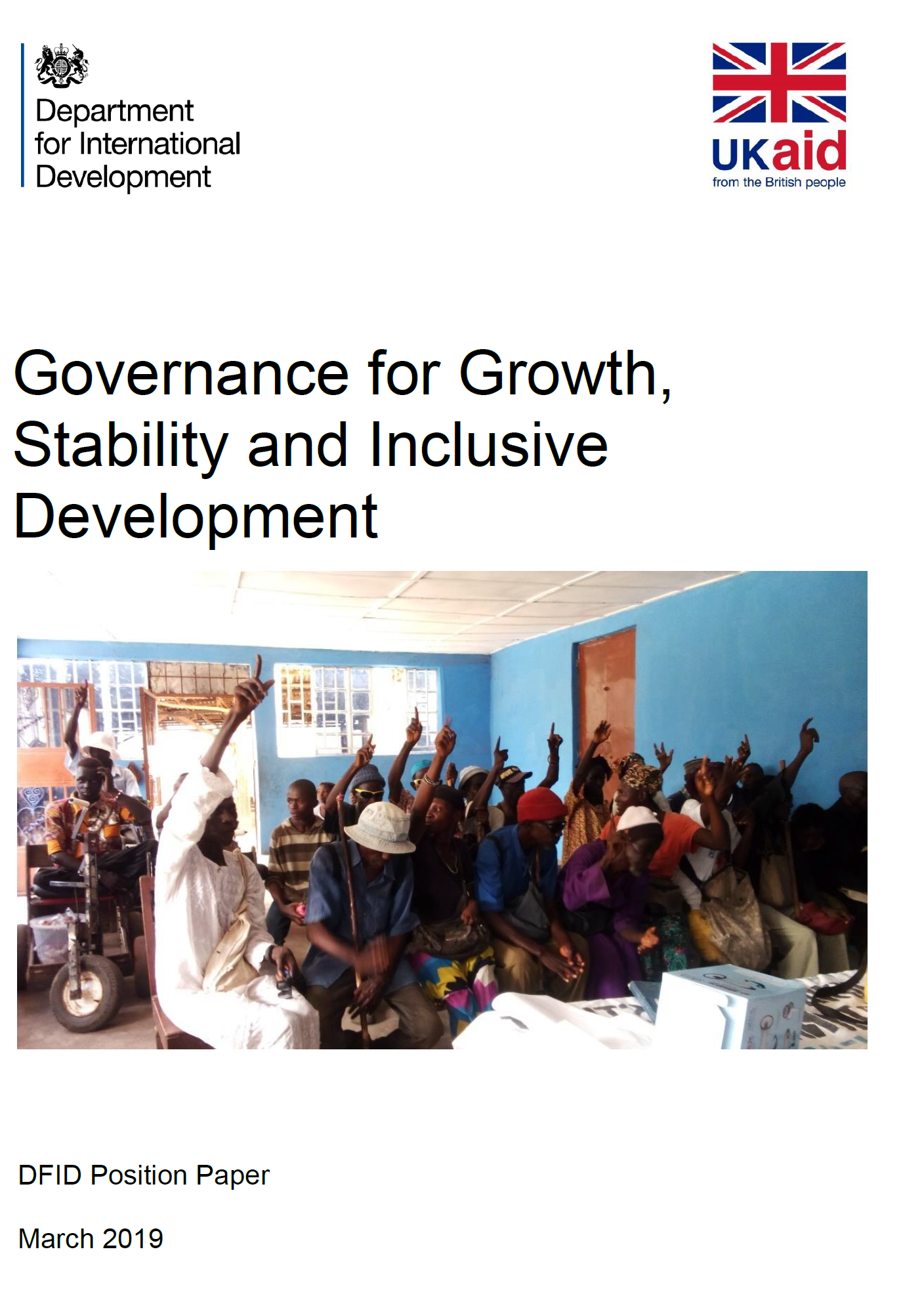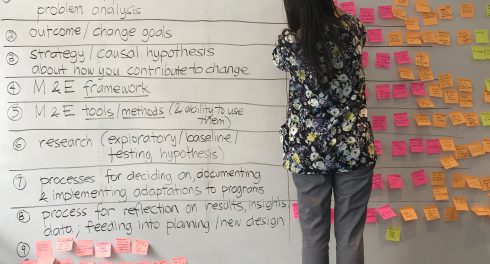
Top of our pile of plane and train reading this past week has been DFID’s new Governance for Growth, Stability, and Inclusive Development position paper. It’s always helpful to see what a core funder of global governance work is thinking and planning to do. All the more so amid much hand wringing over the rise of populism, governance challenges in the digital sphere and more. The paper covers a wide waterfront, including a desire to work with non-traditional partners, a strong emphasis on fairness and inclusion in tax systems, and an explicit desire to respond to shrinking civic space (check out our Shifting Sands report for insight into how donors and grantees are responding to this phenomena).
Donor collaboratives, like TAI, provide a platform for reflection and to ask questions of each other with an eye to finding better ways to align efforts. With that in mind, we invited a few individuals working for other TAI members to share some initial thoughts.
However, before we get to those, we wanted to recognize the value of this being a public document. It’s publication is in line with the shared commitment among TAI Members to publish donor strategies. (For another recent example, see Luminate’s strategy)
So what struck us in the paper? Here are some reflections – please note that these represent individual opinions, not necessarily those of their organizations.
Joseph Asunka (Program Officer, Global Development and Population), Hewlett Foundation
The emphasis on inclusion and locally-led approaches is very thoughtful. Direct and effective participation of minority and marginalized groups in governance and policy decisions, especially around how public resources are mobilized and spent, seems fundamental to realizing the objectives outlined in the paper and the broader ‘leave no one behind’ agenda. It is, therefore, gratifying to learn that DFID will prioritize inclusion going forward. The proposed strategy shifts are inextricably linked, notably the link between tax and inclusion; how governments collect taxes has implications for inclusion. Given the UK’s membership (and hence DFID’s role) in the Addis Tax Initiative, it would be helpful to highlight a few practical implications of the tax-inclusion link for this strategy. And for the country-level work, DFID could play a lead role in promoting more progressive forms of taxation, with greater emphasis on direct (as opposed to indirect) taxation, notably property, wealth, and corporate taxation.
Context also matters a lot and can shift quickly, sometimes in ways that are less visible to external players. DFID’s decision to deepen the extent to which initiatives are designed and implemented in locally-led ways is great news. This partly calls for greater funding flexibility, especially when contexts shift and implementing partners need to adjust their approaches. Additionally, given the growing constraints on formal civil society as acknowledged in the paper, DFID may want to 1) support traditional civil society organizations build their skills on politically savvy approaches; and 2) extend funding to some unusual suspects, e.g., minority, self-organized, and self-led organizations, e.g., persons with disability, who tend to have greater ownership of their agenda and legitimacy within their communities and hence more resilient to closing civic space.
Oladayo Olaide (Deputy Director, Nigeria Office), MacArthur Foundation
It is good to see that DFID is continuing to work on tackling corruption, reducing illicit flows, and improving transparency. UK leadership to reform global rules guiding the return of looted assets by host countries is critical. Right now, it costs too much and takes too long to recover assets and countries have very little success for it. Relatedly, too many ‘big fish’ exploit the weak justice system to escape the law in many countries with widespread corruption challenges. Cynicism could get worse for anticorruption if nothing changes. One option is by equally prioritizing anticorruption “at the interface between service providers and consumers,” i.e., retail level anticorruption approaches.
Commitment failure constitutes a major threat to development intervention. It would be great to see the UK play more active role in pushing governments to respect and fulfil aid commitments. Given that context, the delivery mechanism for the new UK plan is as critical as the plan itself. Too many local groups are crowded out by large-scale international contractors and the private sector chasing development funding. DFID can consider leading in finding more innovative funding and assistance delivery mechanisms that are more inclusive and prioritize leaving domestic groups better than they were.
Megan Colnar (Director, Strategy & Impact) and Robin Varghese (Associate Director, Knowledge & Innovation), Open Society Foundations
The newly-created Economic Justice Program (merged from the former Fiscal Governance and Economic Advancement Programs) at Open Society Foundations welcomes DFID’s release of this paper. We strongly support the practice of transparent communication of strategy from a donor organization, as well as the paper’s thoughtful priming on why DFID cares about open, inclusive and accountable governance and how it intends to work towards it. We were also delighted to see DFID’s commitment to crafting new, more creative metrics to measure complex and long-term outcomes of governance work. We look forward to learning from their team about these evolutions in metrics and hope to rope them into collaborating further with us on this front like via the Fiscal Governance Indicators project!
Under the Economic Justice Program, we hope to deploy the type of integrated and synergistic work between governance and development outlined by DFID throughout the position paper –putting questions of power, markets, and getting governments to work for all people at the heart of our new strategy. The intersection of governance and socio-economic inclusion (as highlighted in the references to SDG 5 and 16, though not 10?) is central to economic justice. As such, we find DFID’s framing here to be very valuable. We also wondered about the omission of analysis on worsening income and wealth inequality. Though this inequality takes many forms, in the relationship between governance and development what we think needs to be made more explicit is how private sector governance and public sector governance shape each other especially with respect to issues of growth and distribution. In many places poor private sector governance flows from poor public governance, to be sure, with the consequence that citizens lose out. But at least just as often, poor or skewed private sector governance (shareholder primacy, poor transparency, terrible accounting and tax practices, capture) becomes one source of poor public governance—distorted norms, rules and incentives.
Finally, though still in the early days of our strategy development, we intend to apply both an inclusion and a gender lens to our thinking about economic justice and were glad to see both championed in this position paper. Although we fully acknowledge the evidence cited by DFID around the benefits of women holding public office, we can’t help but reflect on The Corruption in Fragile States series that thoroughly explored the relationship between the stereotype of “women as the guardians of values” and the extent to which patriarchal notions of ‘boys will be boys’ permits a continued cycle of corruption. This brings us to ask: do we still need evidence to say why society benefits from having women equally share power (or are our values enough)? And if so, to what extent might we be increasing the burden on women to be inherently good in using this evidence? What does this mean about engaging men to solve the problem too? Given DFID’s focus on evidence-based action and their new major investment in The Global Integrity Anti-Corruption Evidence Program (GI-ACE), we look forward to learning alongside our fellow TAI member about how to tackle these complex and intersectional challenges in the governance sector.
Going forward
Going beyond this paper, we look forward to seeing how DFID implements the important strategic priorities they’ve outlined, particularly amid the uncertainty brought by Brexit. The DFID team note a continued commitment to areas that have long been areas of TAI donor joint action and investment, such as working through multi-stakeholder initiatives, supporting anti-corruption efforts, and managing risks and opportunities of new technologies. Yet they also flag issues such as the needs to promote better urban governance and to protect democratic spaces that are newer to the group. We anticipate no shortage of interesting donor conversations to come. Meanwhile, we’re sure the DFID team would welcome more Twitter feedback @DFID_UK


